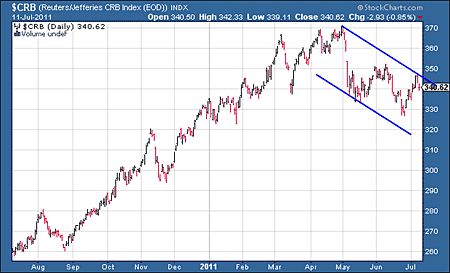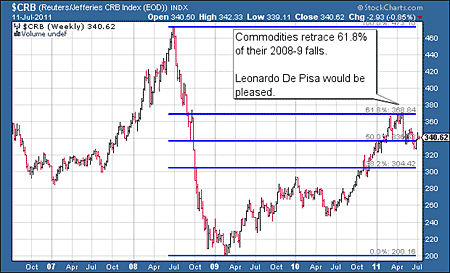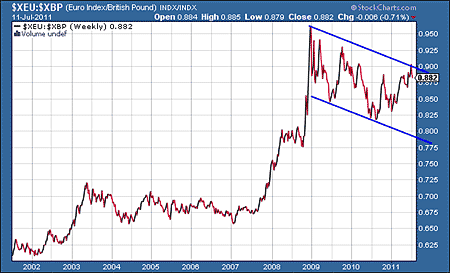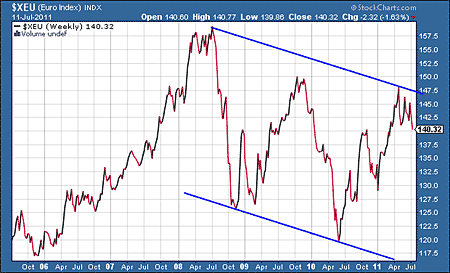I’ve just come back from Ireland.
Recession or not, I found it expensive. I’m from London, and I’m used to having to pay too much for everything. I’d always thought things were more reasonably priced in Ireland – they were last time I went. But, whether it’s food, drink, hotel accommodation or even labour, Ireland is not a cheap country.
It should be. You experience a bust, you lower your prices, you get competitive again.
But they can’t do that. There’s this thing that’s strangling them. And it’s not just strangling the Irish, but the whole of southern Europe.
I’m talking, of course, about the euro. And the question I’m asking in today’s Money Morning is: “Will Ireland stay expensive?”
In other words, what’s next for the euro?
The euro’s surprising strength is down to lack of competition
I am amazed, to be frank, that the euro has remained this strong for this long. It’s not like the problems in southern Europe have come as a surprise.
The real problem for the euro bears has been the competition. What do you short the euro against? We all know the horrendous economic problems our own country faces. Short the euro against the pound? You may as well short manure against dung.
The same analogy applies to the US dollar, which has its very own southern Europe in the form of Illinois, California and New York. Not to mention a central bank head who is desperately keen to keep the greenback as weak as possible. Federal Reserve chairman Ben Bernanke hinted at a return to quantitative easing (QE) in his speech before Congress yesterday, and that was enough to slam the US currency.
The currencies of the commodity-producing nations are, of course, an option. There’s the Canadian and Aussie dollars for example, or the Brazilian real. But the last is overvalued, in my opinion (and the Brazilian authorities, with their ongoing talk of currency wars, keep threatening to do something about it).
Meanwhile, the Aussie dollar has its own problems, in the form of a huge housing market bubble. And as far as Canada is concerned, the commodity markets (which the loonie tends to track) are looking decidedly wobbly. Here’s a chart of the CRB commodities index. While those tramlines remain intact, the trend is down.

By the way, those of you who are compelled by the mystical power of Fibonacci numbers and their application in trading might be interested in this chart. It shows how commodities have retraced exactly 61.8% of their 2008 collapse.

How far could the euro fall against the pound?
Coming back to the euro against the pound, we do seem to have something of a downtrend in place, though from admittedly very high levels.
The euro spent the early part of the noughties trading in the 60-65p range. In 2003, it broke above that level and spent the next five years ranging between 66p and just over 70p. Then in early 2007, it began a two-year run which took it almost to parity.
Since then we have been ranging downwards, as this next chart shows.

We are currently at 88p. But we need a good 20% fall from here to take us back to the 65-70p range before Ireland starts feeling ‘properly priced’ again, and those Spanish property ‘bargains’ actually do look like bargains to sterling buyers.
I think we’re quite a way from that, but I see 78-80p – the lower tramline – as a possibility in the coming months.
Looking at the euro against the US dollar, we see a similar volatile, ranging decline. Below is a five-year chart. If we get a move down in the euro now similar to the one we saw in 2008 and in late 2009-10 (and we are due such a move) we’re headed to the lower trend line in the $1.15 range.
That would be quite a decline. It won’t just be the English buying cheap Spanish houses if that happens. The Americans may be after them too, though they’ll probably find better bargains nearer to home.

The best protection against devaluing currencies
So there’s room for the euro to fall quite dramatically against the dollar, but I am not hugely negative about it against sterling.
A weakening euro might even bring some relief to the eurozone, though on its own, it won’t be enough to solve its problems (see my colleague John Stepek’s Money Morning from earlier this week for more on this: What the crisis in Italy means for your wealth). Systematic currency devaluation has been a tool of over-indebted governments for centuries. The Romans did it. We did it. Now the Americans are doing it.
The Germans are trying their best not to. Given their experiences of hyperinflation, the Germans are understandably paranoid about currency devaluation, even a weaker euro would boost their already strong manufacturing sector even more. Their currency has been among the world’s strongest in the post-WWII era. Their comparative fiscal rectitude has been another reason the euro has stayed so strong.
But at some stage they’ll have to accept a weaker euro because the levels of deflation seen in southern Europe will just be intolerable, if they’re not already. In fact, longer-term, without some kind of devaluation, I don’t see how the currency survives.
Indeed, it might even have collapsed by now if it weren’t for the serious lack of decent alternatives.
There is one, however. That, of course, is gold. More and more people are clearly seeing the attraction. And just this week, it broke out to new highs against the euro, the pound and the dollar. That shows just how essential it is in these times of increasing currency stress.
Category: Market updates

